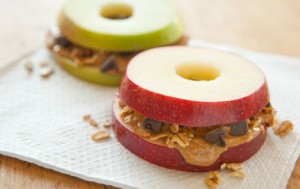 The kids are back to school, and preparing healthy snacks for after school is essential to their well-being. School lunch can be as early as 10 a.m. or as late as 1 p.m. Depending on your child’s lunch time, he or she could be starving by the time school’s out. For children with after-school activities, this scenario could leave them at the mercy of vending machines. The key here is to maximize nutrition and offer green-light foods to hold them over until the family gets together for dinner.
The kids are back to school, and preparing healthy snacks for after school is essential to their well-being. School lunch can be as early as 10 a.m. or as late as 1 p.m. Depending on your child’s lunch time, he or she could be starving by the time school’s out. For children with after-school activities, this scenario could leave them at the mercy of vending machines. The key here is to maximize nutrition and offer green-light foods to hold them over until the family gets together for dinner.
 Consuming a healthy diet and eating at regular intervals can help boost and maintain your energy levels. Proteins, carbohydrates and healthy fats provide the body with the energy it needs to function efficiently, according to the American Dietetic Association. A variety of factors can affect your energy levels, such as sleep patterns, overall health and caloric intake, but consuming certain foods can provide you with the essential nutrients needed to boost your energy levels.
Consuming a healthy diet and eating at regular intervals can help boost and maintain your energy levels. Proteins, carbohydrates and healthy fats provide the body with the energy it needs to function efficiently, according to the American Dietetic Association. A variety of factors can affect your energy levels, such as sleep patterns, overall health and caloric intake, but consuming certain foods can provide you with the essential nutrients needed to boost your energy levels.Caffeinated beverages like coffee can boost your energy levels. Caffeine is in a variety of beverages and foods, such as coffee, chocolate, tea, energy drinks and many soft drinks. According to TeensHealth from Nemours, caffeine stimulates the central nervous system, increases your alertness, elevates your mood and gives you a temporary boost in energy that may last up to six hours. TeensHealth states that the effects of caffeine can vary from person to person depending on your age, weight and caffeine sensitivity, but consuming more than 500 mg — about 5 cups — daily may cause anxiety, dizziness, headaches, disrupted sleep patterns and the jitters.
Fresh fruits such as apples, oranges, pineapples, blueberries, bananas and strawberries can provide a boost of energy. Fruits are rich in vitamins, minerals, antioxidants, fiber and water. According to the Centers for Disease Control and Prevention, fruits also contain simple carbohydrates, sugars naturally found in fruits, vegetables and milk. Simple carbohydrates are easily broken down by the digestive system into glucose, energy used by the body. The University of Missouri Extension says fruits and fruit juices can provide you with a quick boost of energy prior to exercising. Increase your energy level shortly before participating in physical activities such as jogging, running or sports by eating a piece of fruit or drinking a glass of fruit juice.
To boost your energy levels before exercising or dinner, try snacking on yogurt, according to “Fitness” magazine. Yogurt contains both protein and carbohydrates, nutrients that provide you with energy and a feeling of fullness. Sprinkling some crunchy cereal on top of your yogurt can provide additional carbohydrates; combined with protein from the yogurt, this can help increase your energy and delay your hunger for a prolonged amount of time.
Nuts like almonds and walnuts can supply extra energy, according to “Fitness.” Almonds and walnuts are rich in healthy unsaturated fats, which help you stay full for a longer period of time. They also contain healthy amounts of fiber, selenium, vitamin E and omega-3 fatty acids, nutrients that keep the body functioning at an optimal level. Other food sources that contain healthy unsaturated fats include oils such as canola, olive, nut and soybean; seeds; and salmon and tuna.
Incorporating protein-based foods into your daily diet can help boost your energy levels. According to the American Academy of Orthopedic Surgeons, protein-based foods provide your body with the fuel it needs to build and repair tissues. Your body does not have the ability to store extra protein, so it burns it for energy or converts it to fat. You can find protein in a variety of foods, including lean red meat, fish, beans, poultry, nuts, milk, tofu, soy milk, peanut butter, yogurt and cheese. According to the American Dietetic Association, consuming 6 oz. of protein-based food sources daily can provide you with enough protein to boost your energy levels.
 Building muscle strength requires physical weight-bearing exercise, as well as a healthy, nutrient-rich diet. Protein, carbohydrates and fats, as well as vitamins and minerals, all play a role in developing strong muscles. Natural herbs and plant food sources such as lentils, spinach, parsley and even popcorn are healthy additions to a diet to build muscle strength.
Building muscle strength requires physical weight-bearing exercise, as well as a healthy, nutrient-rich diet. Protein, carbohydrates and fats, as well as vitamins and minerals, all play a role in developing strong muscles. Natural herbs and plant food sources such as lentils, spinach, parsley and even popcorn are healthy additions to a diet to build muscle strength.Protein is the building block for muscle repair, and a necessary component of a diet to support strength-building exercise. However, eating loads of protein alone does not improve muscle strength. Meat delivers a lot of protein in a small serving, but it also includes unhealthy saturated fats. Beans cooked in soups, casseroles or blended and served as hummus, bean dip or a sandwich spread provide protein, along with fiber, vitamins and minerals.
Iron carries oxygen to muscle cells, helping them function, repair and grow. Iron depletion can occur at the beginning of a strength training regimen, leading to exhaustion, according to Christopher Newton University. Dark leafy greens such as spinach, wild bitter greens such as nettle and dandelion, and the herb parsley are high in iron content. The vitamin C in these plants helps makes the iron easier to absorb, and unlike red meat sources of iron, these natural plants and herbs are low in calories and fat.
Carbohydrates provide the fuel muscles need to function efficiently. Adults who are strength training should take in about half their daily calories as carbs, according to the American Dietetic Association. Whole grains such as brown rice, oatmeal and whole-grain breads are the best sources of complex carbs that will provide a slow, steady fuel supply to muscles, along with a wealth of vitamins and minerals. For a low-calorie, high-carb, whole-grain snack, try popcorn: Three cups of air-popped corn supply a single serving of carbs to fuel muscles with no fat and minimal calories.
Fat fuels muscles when they are under stress, such as during strength training exercises. Fats are calorie-dense, and fats from meat sources or hydrogenated oils can lead to cardiovascular health problems. About 35 percent of daily calories for people doing strength training should come from healthy fats such as walnuts, pistachios and almonds, according to the American Dietetic Association. In addition to bolstering muscle strength, eating nuts regularly can decrease risk of heart disease, according to the Iowa State University Extension.
 If you are at the beginning stages of a cold make sure you are drinking plenty of water. You can do some physical activity depending on how you are feeling to help stimulates the release of toxins through your skin as you sweat. Don’t overdo it though. You can also use this Chinese remedy to help sweat out the toxins.
If you are at the beginning stages of a cold make sure you are drinking plenty of water. You can do some physical activity depending on how you are feeling to help stimulates the release of toxins through your skin as you sweat. Don’t overdo it though. You can also use this Chinese remedy to help sweat out the toxins.